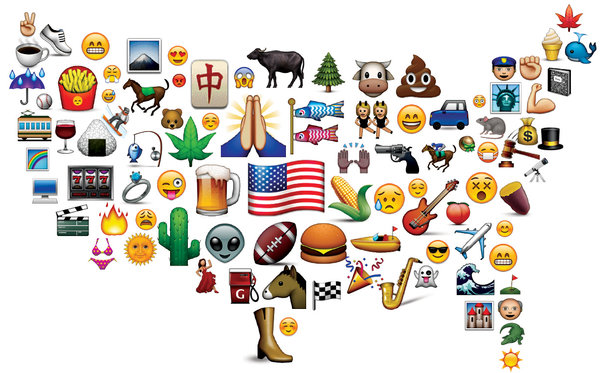(单词翻译:单击)
ALL I wanted to do was wish my fiancée happy birthday using emojis. But I couldn’t replicate the rebus of the classic Sandra Boynton greeting card: Hippo, Birdie, Two Ewes. My vocabulary was too limited.
我无非是想用绘文字祝未婚妻生日快乐而已。但我没法再现桑德拉·博因顿(Sandra Boynton)经典贺卡上的画谜:河马,小鸟,两只母羊。我的词汇量太有限了。
Or I should say that the vocabulary offered by the 722 symbols — faces, animals and various objects — that reside on my smartphone was too limited. The set of emojis that came with my iPhone have birds, seven of them, some very cute, but no hippos and no ewes. It has rams (those are male sheep for readers who know little about animal husbandry), a hog, a cow and even dragons, but no ewes.
应该说,是我的智能手机内置的722个符号——面孔、动物和各种物品——形成了一个非常有限的词库。这些iPhone上自带的绘文字里有鸟,一共七只,有几只非常萌,但没有河马,没有母羊。里面有几只ram(就是雄性绵羊,请对畜牧没什么了解的读者知悉),一只猪,一头母牛,甚至还有几只龙,但没有母羊。

There is a simple reason that joke doesn’t translate into emojis. It is not Japanese. And emojis are.
这个笑话不能翻译为绘文字的原因很简单。它不是日本笑话。而绘文字是日本文字。
They are essentially a foreign language that we have tried to adapt for the English language and American customs. I know I risk sounding like a bureaucrat in the French Ministry of Culture lamenting the dilution of the French tongue by English words like computer and Internet. But that is chauvinism. My complaint is practicality.
从根本上说,绘文字是一种外语,我们试图让它们适应英语和美国习惯。我知道这种腔调听着像个法国文化部官僚在哀叹,法语被computer、Internet之类的英文词给侵蚀了。但那是沙文主义。我不满的是实用性。
Emojis have become a popular way to quickly express yourself on the run. Versions of them are also used on Facebook, Twitter, Google chats and Slack. They should be embracing new vocabulary as the English language embraced words that can’t be translated, like the German schadenfreude or the French flâneur.
绘文字已经成为一种常见的快捷表达方式。Facebook、Twitter、谷歌(Google)聊天工具和Slack都有自己的绘文字。它们应该接纳新的词汇,就像英语接纳无法翻译的外来词一样,比如德语的schadenfreude(幸灾乐祸),或法语的flâneur(闲逛的人)。
There is just too much I can’t express because the symbols don’t exist. Apple is expected to release a revised set of emojis for the iPhone and iPad in the spring. Mostly it will be offering more racially diverse versions of the existing white faces and hands: black, brown and yellow. (If that made you wince, then you won’t be surprised that the change is already getting some people hot under the collar. And no, you can’t express that American idiom with emojis.)
由于符号的缺失,我有太多的东西无法表达出来。苹果(Apple)有望在今春发布一套修订版iPhone和iPad绘文字。其中主要的改变是在现有的白面孔和手的基础上大幅增加种族多样性,加入黑、棕和黄。(如果这事让你摇头,你大概能想象,已经有人对此hot under the collar[直译“领子下发烫”,意即“怒火中烧”。——译注]了。是的,这句美国成语也没法用绘文字表达。)
The original all-white cast reflects how a homogeneous Japanese society sees itself. If you look at their comic books (manga) and cartoons (anime), you know what I’m talking about. Many tall, long-legged blondes with big round Emma Stone eyes populate those universes.
原版绘文字里的人物全是白皮肤,这反映了一个同质性的日本社会对自身的看法。去看看他们的漫画(manga)和动画(anime)你就明白了。那里面满是长腿高个子金发姑娘,长着一对又大又圆的艾玛·斯通(Emma Stone)式眼睛。
Expanding the universe of humans solves only part of the problem because the entire set is infused with Japanese sensibilities. There is the unchi-kun, or the smiling poop emoji. That character had appeared for decades in Japanese commercials, in bedrooms as children’s plush toys and even as candy before it ever showed up on a cellphone screen.
拓展人类谱系只解决了一部分问题,因为整套绘文字依然浸淫着和式感性。里面有“运气君”(unchi-kun),就是一坨笑眯眯的屎。在进入手机之前,这个角色在日本已经存在了几十年,它出演过广告,被做成毛绒玩具摆在孩子的卧室里,甚至还做成糖果。
Or look at the smartphone screen full of buildings. One of them is a “love hotel,” a place for assignations where wildly decorated rooms can be rented for an hour or two. No seedy motels are offered. Japanese love their excellent public transportation, and I count 12 train symbols and three aerial tramways. But no pickup truck.
再来看看智能手机上满屏的建筑物。其中有“情侣酒店”,这是一种约会的地方,有装修十分夸张的房间可供情人们租用一两个小时。里面没有破破烂烂的汽车旅馆。日本人对他们卓越的公共交通系统钟爱有加,我一共找出了12个火车符号,三种空中缆车。没有皮卡。
Indeed, the Japanese vocabulary is most notable for what it fails to offer Americans. For example, there is no middle-finger hand signal. Or the good-luck signal of fingers crossed. No Vulcan salute to live long and prosper, which would have been much appreciated following the recent death of Leonard Nimoy, who played a Vulcan on “Star Trek.”
这份日语词汇表实在很少照顾到美国人的需求。比如里面没有竖中指的手势。也没有两指交叉的好运手势。没有祝愿“生生不息,繁荣昌盛”的瓦肯礼,鉴于《星际迷航》(Star Trek)中饰演瓦肯人的伦纳德·尼莫伊(Leonard Nimoy)近日刚刚去世,要是有的话应该会是件很贴心的事。
Want to tell your boss you’re too sick to go to work? The face mask emoji works in Japan, where regular people wear them in public. In America your boss might think you quit to go to med school or started robbing banks. (There is also no broken-down car, also useful for excuses.)
想对老板说病重不能去上班?在日本可以用一个戴口罩的绘文字,那里普通人也会在公共场合戴口罩。在美国,你老板可能会以为你要辞职去读医学院,或者抢银行。(另外也找不到趴窝的汽车,那应该也是个好用的借口。)
Among the pets there are no labs or golden retrievers, just Akitas and a poodle. Nothing for that most American of holidays, Thanksgiving. No turkey. Not even a whole roasted chicken.
宠物里没有拉布拉多或金毛,只有秋田犬和贵宾。感恩节这个最具美国特色的节日,里面毫无提及。没有火鸡。连整只的烤鸡都没有。
Food is a particular problem. There is no steak, no burritos, no bacon and no kale. (Though the dragon head kind of looks like kale and might be an adequate substitute.)
食物的问题格外严重。没有牛排,没有墨西哥卷饼,没有培根,没有甘蓝菜。(不过龙头倒是挺像甘蓝,也许可以冒充一下。)
An international body exists that is trying to add as many as 250 emojis. The list is long and the debate contentious.
有一个国际组织正在尝试加入多达250个绘文字。候选列表很长,各方争执不下。
To make room, they could eliminate the emojis that represent the strange Japanese fascination with antiquated technology like three kinds of CDs, a floppy disk and tape cassette, pager and TV with rabbit ears.
为了腾出空位,他们可能会去掉一些现有的绘文字——它们体现的是日本人对古董级技术的痴迷,比如里面有三种CD,有软盘和磁带、寻呼机和带兔耳天线的电视机。
But please don’t get rid of what looks like a film noir sequence of emojis: lit cigarette, bomb, pistol, knife, pill, bloody hypodermic needle and money bag. That’s speaking my language.
但是请不要去掉那些黑色电影片段一般的绘文字:点燃的香烟,炸弹,手枪,刀,药丸,血淋淋的皮下注射器,钱袋。那是我的语言。


